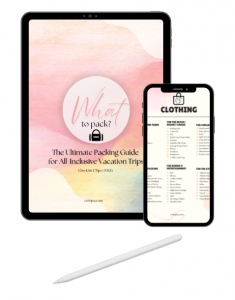As you embark on exciting journeys around the globe, basking...
Travel Budget Planner and Checklist
Traveling is an enriching experience that allows us to explore new cultures, create lasting memories, and broaden our horizons. However, planning a trip can be overwhelming, especially when it comes to managing your travel budget effectively. The Travel Budget Planner and Checklist can help you to make the most of your travel adventures without breaking the bank.
Share this post with your friends!
Travel Budget Planner & Checklist
Download for FREE
Travel Budget Planner & Checklist in Excel
Start using the Ultimate Travel Budget Planner and Checklist in Excel today, and embark on your dream trip without the stress of overspending. Happy Travel!
This comprehensive tool will guide you through the process of budgeting for your trip, tracking expenses, and ensuring you have a memorable and affordable travel experience. In this guide, we’ll explore the significance of a travel budget, provide a step-by-step guide to creating a travel budget plan, and offer a helpful checklist to keep your travel finances in check.
I. Understanding the Importance of a Travel Budget
In this section, we emphasize the significance of creating a travel budget. It highlights how a budget helps with financial planning, allows you to prioritize your expenses, avoid overspending, and maximize the value of your travel experiences.
A. Financial Planning and Control: Creating a travel budget allows you to plan your expenses in advance and have better control over your finances. It helps you determine how much you can afford to spend on your trip and allocate funds accordingly. By having a clear financial plan, you can avoid unexpected expenses and ensure that you stay within your means.
B. Prioritizing Experiences and Activities: A travel budget helps you prioritize the experiences and activities that are most important to you. By allocating funds to the things that matter most, you can make the most of your travel budget and focus on the experiences that will create lasting memories.
C. Avoiding Overspending and Debt: One of the key benefits of a travel budget is that it helps you avoid overspending and going into debt. By setting spending limits and tracking your expenses, you can make informed decisions about where to splurge and where to save. This ensures that you don’t exceed your budget and return from your trip with financial stress.
D. Maximizing Value for Money: A well-planned travel budget allows you to maximize the value of your money. By researching and comparing prices, taking advantage of travel deals, and making cost-conscious decisions, you can stretch your budget further and get the most out of your travel experience. This enables you to enjoy quality accommodations, activities, and dining options without breaking the bank.
In summary, a travel budget is essential for financial planning and control, prioritizing experiences, avoiding overspending and debt, and getting the best value for your money. It empowers you to make informed decisions and ensures that your travel adventures are both enjoyable and financially responsible.
II. Creating Your Travel Budget Plan
This section provides a step-by-step guide to creating a travel budget plan. It covers various aspects such as setting travel goals, researching destination costs, estimating transportation expenses, budgeting for accommodations, allocating funds for meals and dining, planning for activities and entertainment, incorporating travel insurance costs, and accounting for miscellaneous expenses.
A. Setting Travel Goals and Priorities: Start by defining your travel goals and priorities. Determine the purpose of your trip, the destinations you want to visit, and the experiences you wish to have. This will help you allocate your budget to align with your travel aspirations.
B. Researching Destination Costs: Conduct thorough research on the costs associated with your chosen destinations. Look into factors such as accommodation prices, local transportation expenses, food costs, and entrance fees for attractions. This information will give you a realistic understanding of the expenses you can expect. >> Learn more
C. Estimating Transportation Expenses: Consider the costs of getting to your destination and moving around within it. Research flight prices, train or bus fares, or rental car costs, depending on your preferred mode of transportation. Estimate these expenses to include them in your budget plan. >> Learn more
D. Accommodation Budgeting: Decide on the type of accommodation that suits your needs and budget, whether it’s hotels, hostels, vacation rentals, or alternative options like camping. Research and compare prices to set a realistic budget for your accommodations. >> Learn more
E. Allocating Funds for Meals and Dining: Food expenses can vary greatly depending on your destination and dining preferences. Research the average cost of meals in the places you’ll be visiting and allocate funds accordingly. Consider factors like eating at local establishments, cooking some of your meals, or packing snacks to save on costs.
F. Planning for Activities and Entertainment: Make a list of the activities and attractions you want to experience during your trip. Research the costs associated with each activity, such as museum entry fees, guided tours, or adventure excursions. Allocate funds in your budget to cover these expenses. >> Learn more
G. Incorporating Travel Insurance Costs: Travel insurance is crucial for protecting yourself against unforeseen events. Research different travel insurance options and consider their costs. Factor this into your budget to ensure you have appropriate coverage throughout your trip. >> Learn more
H. Accounting for Miscellaneous Expenses: Account for additional expenses that may arise during your trip, such as visa fees, local transportation within the destination, tips, souvenirs, and unforeseen emergencies. Set aside a portion of your budget to cover these miscellaneous expenses.
By following these steps and considering the various aspects of your trip, you can create a comprehensive travel budget plan. It allows you to have a clear understanding of your expenses, make informed decisions, and ensure that your travel experiences align with your financial means.
III. The Travel Budget Planner Checklist
Here, we present a detailed checklist that breaks down the key elements of your travel budget. It includes destination research and cost estimation, transportation expenses, accommodation budgeting, daily meals and dining, activities and sightseeing, travel insurance, miscellaneous expenses, and the importance of emergency funds and contingency planning.
A. Destination Research and Cost Estimation: Conduct thorough research on your destination to estimate the overall cost of your trip. Consider factors such as local currency exchange rates, average daily expenses, and the cost of attractions and activities. This research will help you set a realistic budget for your trip.
B. Transportation Expenses: Account for transportation costs to and from your destination, as well as local transportation within the area. Include expenses for flights, train or bus tickets, rental cars, taxis, or any other modes of transportation you plan to use during your trip.
C. Accommodation Budgeting: Determine your accommodation preferences and allocate a budget for lodging. Research different options, such as hotels, hostels, vacation rentals, or camping, and consider their prices and amenities. Set a budget that aligns with your comfort level and travel goals.
D. Daily Meals and Dining: Plan your food expenses by estimating the cost of daily meals and dining out. Research the average price of meals at your destination and decide on your dining preferences. Allocate funds accordingly, keeping in mind that you may save money by trying local food or preparing some meals yourself.
E. Activities and Sightseeing: List the activities and attractions you plan to experience during your trip. Research their costs, including entrance fees, guided tours, or any additional expenses. Allocate funds for these activities in your budget, ensuring that you prioritize the experiences that matter most to you.
F. Travel Insurance: Include the cost of travel insurance in your budget plan. Research different insurance providers, compare coverage options, and allocate funds to ensure you have adequate protection against unforeseen events such as trip cancellations, medical emergencies, or lost belongings.
G. Miscellaneous Expenses: Account for miscellaneous expenses that may arise during your trip. This can include visa fees, local transportation within the destination, tips, souvenirs, or any unexpected costs. Set aside a portion of your budget to cover these miscellaneous expenses.
H. Emergency Funds and Contingency Planning: It’s important to have emergency funds and contingency planning in place. Set aside a portion of your budget as an emergency fund to handle unforeseen circumstances or unexpected expenses that may arise during your trip. Having this buffer ensures you are prepared for any financial challenges that may occur.
By following this travel budget planner checklist, you can effectively plan and manage your travel expenses. It ensures that you consider all the essential elements of your trip and allocate funds accordingly, giving you financial peace of mind and allowing you to make the most of your travel experience.

The FREE Packing Guide for All-Inclusive Trips
Download our fillable and printable packing list + tips + more!
IV. Statistics and Insights
This section provides relevant statistics and insights related to travel budgeting. It may include average travel expenditure by destination, the impact of currency exchange rates on budgets, and the potential cost savings that can be achieved through advanced bookings and travel deals.
A. Average Travel Expenditure by Destination: Explore the average travel expenditure for different destinations. This statistic provides insight into the typical costs associated with specific locations, helping you gauge how much you may need to budget for your trip.
B. Impact of Currency Exchange Rates on Budgets: Understand how currency exchange rates can affect your travel budget. Fluctuations in exchange rates can impact the cost of accommodations, meals, and activities in foreign countries. Stay informed about exchange rates to plan your budget effectively. >> Learn more
C. Cost Savings through Advanced Bookings and Travel Deals: Discover the potential cost savings you can achieve by booking your travel arrangements in advance or taking advantage of travel deals and promotions. Planning ahead and being flexible with your travel dates can lead to significant savings.
V. Tips for Maximizing Your Travel Budget
Here, we offer practical tips to help you make the most of your travel budget. The tips may include suggestions such as being flexible with travel dates, utilizing travel rewards programs and credit card benefits, opting for affordable accommodations, seeking local and budget-friendly dining options, and prioritizing free or low-cost activities and attractions.
A. Flexibility in Travel Dates: Being flexible with your travel dates allows you to take advantage of off-peak or shoulder seasons when prices tend to be lower. Adjusting your travel schedule can result in substantial savings on flights, accommodations, and activities.
B. Utilizing Travel Rewards Programs and Credit Card Benefits: Make the most of travel rewards programs and credit card benefits to earning points, miles, or cash-back rewards. These rewards can be used to offset travel expenses, providing you with additional savings and perks.
C. Opting for Affordable Accommodations: Consider choosing budget-friendly accommodations such as hostels, guesthouses, or vacation rentals. These options often provide comfortable and affordable alternatives to traditional hotels, allowing you to stretch your travel budget further.
D. Seeking Local and Budget-Friendly Dining Options: Explore local eateries, street food markets, or grocery stores to experience authentic cuisine at a lower cost. By opting for local and budget-friendly dining options, you can savor the flavors of your destination without straining your budget.
E. Prioritizing Free or Low-Cost Activities and Attractions: Research and prioritize free or low-cost activities and attractions at your destination. Many cities offer museums, parks, festivals, or cultural events that can be enjoyed without breaking the bank. This allows you to experience the essence of a place while minimizing expenses.
VI. Utilizing Technology and Tools
In this section, we highlight the importance of leveraging technology and tools to aid your travel budgeting efforts. We may mention the use of travel budget apps and expense trackers to keep track of your expenses and online comparison platforms to find the best deals on flights and accommodations.
A. Travel Budget Apps and Expense Trackers: Take advantage of travel budget apps and expense trackers to monitor and manage your spending. These tools help you stay organized, track your expenses in real time, and ensure that you stay within your allocated budget.
B. Online Comparison Platforms for Flights and Accommodations: Utilize online comparison platforms to find the best deals on flights and accommodations. These platforms allow you to compare prices, amenities, and customer reviews, ensuring that you secure the most cost-effective options for your trip. >> Learn more
Share this post with your friends!
VII. Summary
Traveling on a budget doesn’t mean compromising on quality or missing out on incredible experiences. By utilizing the Travel Budget Planner and Checklist provided in this article, you can effectively plan your expenses, make informed choices, and have a fulfilling travel adventure within your financial means. Remember to stay flexible, prioritize your spending, and seek out cost-saving opportunities during your trip. With careful planning and smart budgeting, you can embark on a memorable journey without putting a strain on your wallet. Start using the Ultimate Travel Budget Planner and Checklist today, and embark on your dream trip without the stress of overspending. Bon voyage!
Download for FREE
Travel Budget Planner & Checklist in Excel
Start using the Ultimate Travel Budget Planner and Checklist in Excel today, and embark on your dream trip without the stress of overspending. Happy Travel!
Recommended for You:
Quick Links: Travel Guides | Travel Gear | Packing Lists...
Embarking on a Royal Caribbean cruise is not just a...





